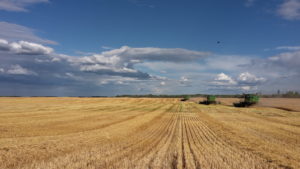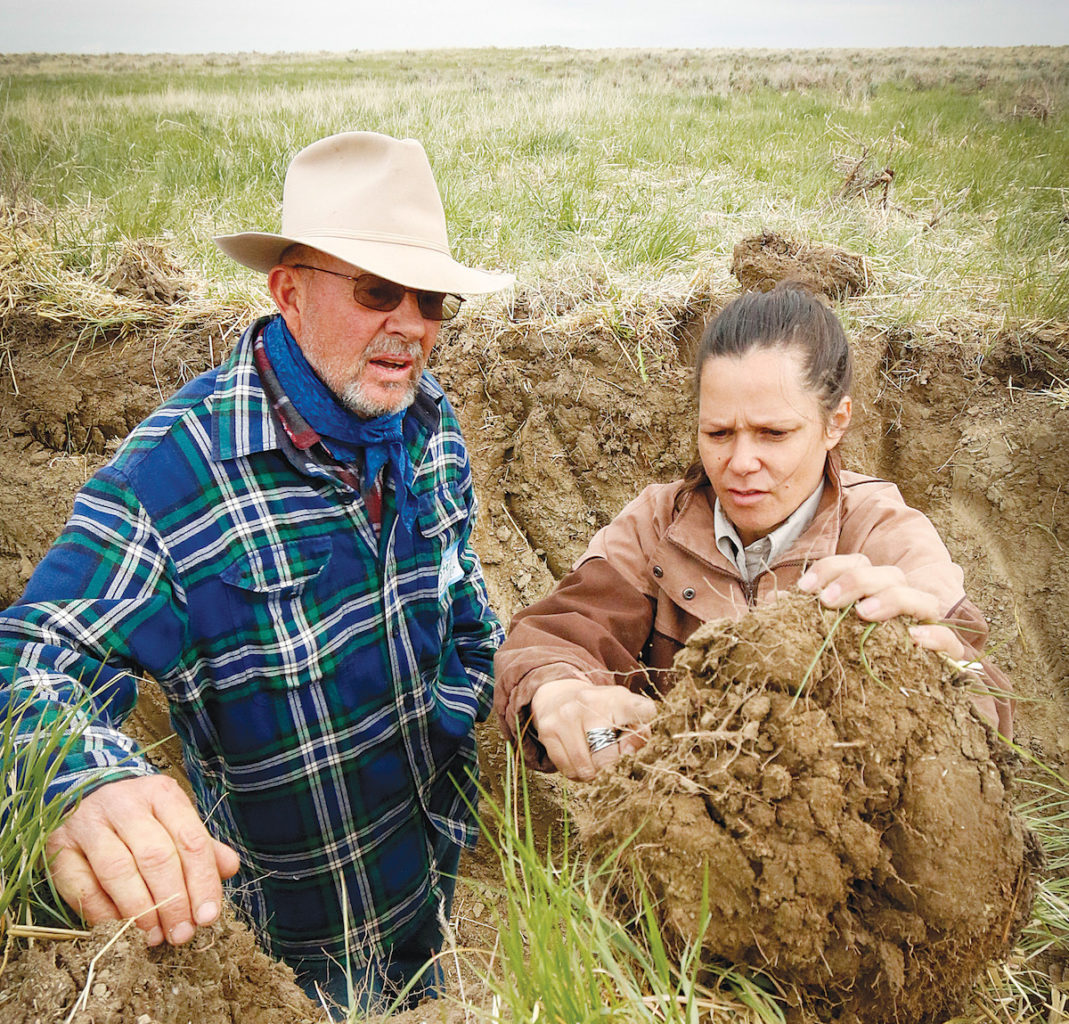
The “worm is turning” as operators look to regenerative agriculture to confront a perfect storm of challenges.
Many regions look to North America as the example for successful high-volume production models. In this changing world agriculture is progressively seeing the value for whole systems accounting and the 3 pillars for sustainability; people, planet and profits. The modern chemical ag model is found to be failing on all of these promises. What we are witnessing are the many “unintended consequences” from applying mechanical thinking to biological systems. The embrace of post-modern regenerative agricultural systems is shifting the conversation in food production landscapes.
For myself, my key driver has always been: how do we get detrimental chemicals out of the food and environment, sequester GHG, grow quality food for animals and people, all while ensuring producers are being justly rewarded for their efforts?
Nicole Masters and Montanan rancher Steve Charter digging deeper to understand how soil dynamics influences above-ground production. Steve is one of a growing number of ranchers who are putting life back into degraded rangeland. Photo Credit: Laura Nelson, freelance writer, Montana.
Integrity Soils systems approach
I originally started out working in community gardens, horticulture and small wetlands in New Zealand in 1999. Now, I work with a team of agroecologists across North America and Australasia; focusing on large scale food and fibre producers. With a background in ecology and soil science the rigorousness of Regenerative Agriculture is appealing. Norman Uphoff has remarked that post-modern agriculture “is not anti-science. It is the most modern agriculture because it builds carefully and creatively on advances in scientific knowledge particularly in the disciplines of biology, ecology and microbiology.” In this era of information, we have more tools and understanding around the benefits of working with natural systems.
We are results based, with our clients managing close to one million acres; acreage which continues to grow through word of mouth. We deliver workshops and presentations to thousands of producers every year. We are part of a growing community of people who are facilitating a rapidly expanding world of quality food production and biological economies.
Norman Uphoff has remarked that post-modern agriculture “is not anti-science. It is the most modern agriculture because it builds carefully and creatively on advances in scientific knowledge particularly in the disciplines of biology, ecology and microbiology.”
My team is trained in behavioral change and organizational learning; applying ecological principles to agricultural settings. Our approach focuses on connecting with producers; what their goals and personal drivers? It’s a more personal and in-depth approach in a domain which has been traditionally more technical and chemically-oriented; the “command and control” paradigm. In part, that may explain why 75% of my team is made up by women.
Tools for transformation
Most producers see themselves as land stewards. What has been missing however, has been the structural supports and tools to help them achieve these goals. My team trains and coaches producers in honing their observations; asking the “why” questions around input choices, and deepening their understanding of causal factors behind many challenges; such as weeds, pests and diseases. Increasingly producers are asking; how can we manage landscapes better for biodiversity, water and resilience in an increasingly unpredictable climate?
What we have found is through encouraging producers to trial new methods, and providing support and benchmarking, they see the results for themselves. Becoming aware of how chemicals and soluble fertilizers have been leading them down a slippery path to increased external reliance, is a door that once opened, can never be closed again.
Through working with and enhancing natural cycles; producers can dramatically reduce inputs and improve crop, animal and soil health. For example, when working with large-scale broadacre croppers, in the first year they are able to reduce their nitrogen by 30-70%, herbicides by 30%, fungicides and chemical pesticides by 100%, with little to no yield loss. That’s right, we can substantially drop those costly and detrimental inputs through a focus on increasing efficiencies through harnessing the microbiological workforce.
The Worm is Turning
Twenty years ago many producers seemed motivated to change due to a personal crisis such as health concerns or crop failures due to climatic extremes. Now, we live in an increasing global community, and producers face more scrutiny about land practices. Now the conversation is shifting, to include larger top performance producers. They see a perfect storm coming; with soil health and organic matter declines, consumer signals, increasing costs and pest pressures. They are sharp operators and a joy to work alongside.
There is still community ridicule to ride, however the producers we work with wear big enough boots to know that the tide is shifting their way. Neighbors continue to look over the fence with chemical agronomists feeding stories of fear to keep them in line. However, we are heartened by what we are witnessing. There is a growing number of producers who see new opportunities through working closer with nature, giving rural communities more confidence around the future of agriculture
